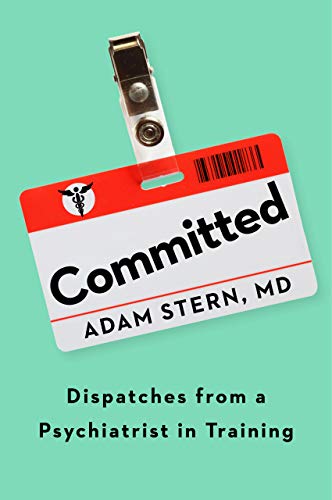Author: Adam Stern MD
ISBN: 978-035843-4733
APA Style Citation
Stern, A. (2021). Committed: Dispatches from a psychiatrist in training. Houghton Mifflin Harcourt Publishing, New York, N.Y.
Buy This Book
https://www.amazon.com/Committed-Dispatches-Psychiatrist-Adam-Stern/dp/0358434734
| committed_activity_.pdf |
Adam Stern takes the reader through his four-year clinical psychiatry residency program at Harvard Medical School. Because the field of psychiatry culminates in a medical degree, Stern must complete rotations in the pediatric and cardiac wards and work in the emergency psychiatric wards. Stern is at first concerned that he is not as qualified as his other classmates who have been admitted to the prestigious program at Harvard but quickly realizes that each of his classmates has their own areas of expertise and other areas in which their learning curve is steep.
The hours and expectations for residents are exhausting, often working 20-hour shifts and sleeping for only a few hours each night. The few moments of socialization are generally spent with those in the program. Stern quickly learns the hierarchy, which generally involves first-year residency students completing the most menial tasks and far more paperwork than he ever thought possible. He describes his frustration while working on rotations, such as the cardiac and pediatric wards, feeling like he is wasting precious time on information and skills that he will not use. He is equally skeptical when he is assigned to work with a doctor providing electroconvulsive therapy (ECT)to depressed patients who are not helped by medications. Stern becomes a convert when he sees the incredible progress that some of these patients make after the ECT treatment. Stern goes on to describe the terrible feeling of guilt associated with losing a patient to suicide and his feelings of usefulness when he sees the same patients returning to the psychiatric ward over and over again. He describes trying to overcome the skepticism that some people have about seeing a psychiatrist and finding the right balance between talk therapy and medication.
Outside of the hospital, the residents are still enrolled in classes. Stern, at first, was skeptical about a seminar titled “becoming a psychologist,” which he labeled as a “feelings class.” This group allowed students to share their experiences, challenges, and victories. The group would remain together for the length of the program. Despite his original hesitancy, the people in this group became some of his closest friends and a group that depended on one another for practical and emotional support. This group understood the stress and emotional turmoil that came with the program and were there to support and help each other. By the end of the program, Stern and the others came to depend on their “feelings” class as a lifeline.
The evolution that Stern went through in these four years was transformational. He admits he felt like an imposter in his first year with his fellow students, more experienced doctors, and patients. By his fourth year, he acknowledged that he still had much to learn but realized that he had chosen the right path and was just as capable as his other high-achieving classmates. He realized that he will not be able to “cure” every patient he sees, but he is dedicated to doing the best he can. This is an informative book for those interested in pursuing a career related to medicine or psychiatry/psychology. It provides a behind-the-scenes look at the real day-to-day life of the path of becoming a psychiatrist and how it requires full commitment. Dr. Stern goes on to practice at Beth Israel Deaconess Medical Center in Boston and is an assistant professor at the Harvard School of Medicine.
Other Related Resources
Author’s website
https://www.adamsternmd.com
Twitter feed
https://twitter.com/adamphilipstern
Interview with Adam Stern with the Boston Public Library and the State Library of Massachusetts
https://www.youtube.com/watch?v=jgeIPLWQwKo
Psychology Today: Finding the line between Connection and Avoidance
https://www.psychologytoday.com/us/blog/stern-talk/202112/finding-the-line-between-connection-and-avoidance
Psychology Today: Our Mental Healthcare System is Broken, but we can fix it
https://www.psychologytoday.com/us/blog/stern-talk/202106/our-mental-healthcare-apparatus-is-broken-we-can-fix-it
Good Therapy: Psychiatry 101: How to Become a Psychiatrist
https://www.goodtherapy.org/for-professionals/personal-development/become-a-therapist/article/psychiatry-101-how-to-become-psychiatrist
Become with lantern: How to Become a Psychiatrist
https://www.learnhowtobecome.org/psychiatrist/
Psychological Figures and Concepts
Erik Erikson
Sigmund Freud
Autonomy v. shame and doubt
Anxiety
Cognitive-behavioral therapy
Depression
ECT therapy
Intimacy v. isolation
Neurology
Paranoia
Psychiatry
Psychology
Psychopharmacology
Psychotherapy
Schizophrenia
Social anxiety
Suicide
Transcranial magnetic stimulation (TMS)

 RSS Feed
RSS Feed